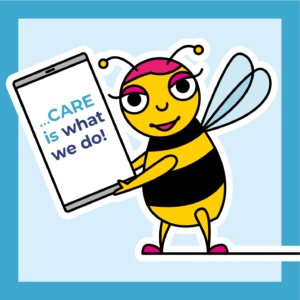Care plans, be they on paper or digital, form the backbone of the plan of support care for any service user whether they are cared for in a care home setting or at home. Done properly, care planning can create a very useful template for care, done badly they:
 Can mislead care staff
Can mislead care staff- Fail to identify care issues
- Mean some aspects of a person’s care are overlooked
- Waste time and resources
- Will create problems with regulators
In this blog, we identify 10 of the biggest blunders care staff make when care planning.
- Failing to consult the service user – it is their care and support plan after all. How can it be person-centred if they aren’t the main person involved in creating it? it is too easy to decide that you know what is best for the service user when in fact, most of the time, people do know what is best for them. When consulting with service users about their care plan, it is worth pointing them to some sources of information such as,https://www.scie.org.uk/person-centred-care/care-planning.
- Writing about the “service user” and not the person. It’s always better to understand what Reg needs or wants than “the service user”. Using their name suggests some consultation has occurred and the care plan is person-centred. At http://www.careis.net, we have seen people take this to the extreme and make comments which obviously did not come from the person, for example when dealing with behavioural issues, so beware of faking it.
 Failing to use a care plan template can lead to issues which need care planning being missed. Care planning templates, such as that in the care and support element of digital care management systems CAREis, http://www.careis.net, enable users to be holistic in their planning.
Failing to use a care plan template can lead to issues which need care planning being missed. Care planning templates, such as that in the care and support element of digital care management systems CAREis, http://www.careis.net, enable users to be holistic in their planning.- Not using all of the template because somethings are difficult or embarrassing to talk about. This can lead to unnecessary stress, missed care and neglect! And yes the regulator will expect you to understand something about your service users sexuality!
- Being too brief describing interventions in the care plan. What does “help Joan clean her teeth” actually mean? How would an agency carer know how to help Joan? Perhaps here is the opportunity to describe in detail in the care plan what teeth Joan has, how they are cleaned, what toothbrush is used, what toothpaste and how much and if Joan needs someone to clean her teeth for her or if she needs prompting and supporting. The questions “what would an agency carer do with this information is a good rule of thumb – if they can’t pick up the care plan and understand what to do, then perhaps it contents too little information or the plan is missing some important detail.
 Being to complex or too wordy. Interventions especially need to hep the person reading them to provide care as if you, the person writing the care plan, were the one doing it. It’s called continuity of care. If it is too wordy, the meaning may get lost or other carers may just not bother reading it.
Being to complex or too wordy. Interventions especially need to hep the person reading them to provide care as if you, the person writing the care plan, were the one doing it. It’s called continuity of care. If it is too wordy, the meaning may get lost or other carers may just not bother reading it.- Failing to consult other staff. Often senior care staff or nurses write care plans which more junior team members deliver and guess what… it is often those who deliver the care who know what is actually going on. This is called working in a multidisciplinary manner and is at the heart of good care in both the health and social care settings. It is also an opportunity to teach the more junior staff about the process of writing a care plan.
- Failing to consult family and friends can mean some care and support plans, especially for service users living with diminished capacity, don’t cover all they should and therefore miss the context of the persons life. This is a short sighted approach to care planning after all how can a carer write about someone they don’t know well? Use all the resources at your disposal and not only will the plan be all the better for it, so will your relationship with the family and friends of the service user.
- They focus on the person’s inabilities and fail to identify and work to their strengths and abilities. Such care plans are themselves disabling rather than enabling, they fail to identify ways to maximise the individual’s abilities to self-care or be involved in their own care in favour of quick and easy carer led care. This is not person-centred and reflects poorly on the person writing the care plan.

- Not consulting, not using a template and being carer centred means many care plans fail to use evidence to inform their interventions – they are not evidence-based. Evidence means getting ideas for care from places like NICE or SCIE, but it also means listening to others, that includes:
- The service user
- The service user’s family and friends
- Other staff
- other agencies and professionals who know the service user
In later blogs we will consider some aspects of good practice in the writing of care plans, but for now it is worth remembering one simple fact, the care plan is about and belongs to the service user and the way information is collected for them and the how they are written needs to reflect this.
This means that writing a care plan is not a solitary undertaking. Managers should not, for example, take themselves off into their office to write a care plan alone because as we have seen care plans are not only about the service user, they belong to the service and represent not only their care in the here and now, but also in the context of their life.
As well as being person-centred therefore, care plans need to be holistic, that is they need to account for the needs and wants of the person as a whole. This means using templates, such as those available within digital care management software systems to ensure that the person writing the plan covers every aspect of the persons life which is pertinent to the provision of care.
